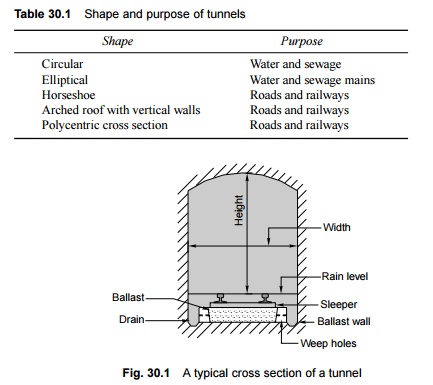Chapter: Civil : Railway Airport Harbour Engineering : Railway Engineering : Railway Tunnelling
Railway Tunnelling: Size and Shape of a Tunnel
Size and Shape of a Tunnel
The size and shape of a tunnel
depend upon the nature and type of ground it passes through and also on whether
it is designed to carry a single or a double railway line. The shape of a
tunnel should be such that the lining is able to resist the pressures exerted
by the unsupported walls of the tunnel excavation.
If the ground is made up of solid
rock, then the tunnel can be given any shape. Tunnels in rocky terrains are
generally designed with a semicircular arch with vertical sidewalls. In the
case of soft ground such as that consisting of soft clay or sand, the pressure
from the sides and the top must be resisted. A circular tunnel is generally
best suited for resisting both internal and external forces regardless of the
purpose for which the tunnel is used. Theoretically, a circular section
provides the largest cross-sectional area for the smallest diameter, which
provides greater resistance to external pressure. But this type of cross
section is more useful for drains carrying sewage and fluids and for aquaducts
built for irrigation purposes. For railway track, the circular portion at the
bottom of the tunnel has to be levelled in order to lay the track and
facilitate the easy removal of muck and placing of concrete. The typical cross
section of a tunnel is shown in Fig. 30.1. The sections commonly adopted for tunnelling
and the purposes these tunnels serve are enumerated in Table 30.1.
Table 30.1 Shape and purpose of
tunnels

The size of a railway tunnel
depends upon the gauge of the railway track and the number of lines. The
typical dimensions for railway tunnels are specified in Table 30.2.
Table 30.2 Size of the tunnel

Related Topics